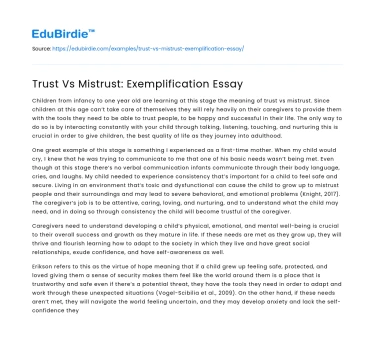Children from infancy to one year old are learning at this stage the meaning of trust vs mistrust. Since children at this age can’t take care of themselves they will rely heavily on their caregivers to provide them with the tools they need to be able to trust people, to be happy and successful in their life. The only way to do so is by interacting constantly with your child through talking, listening, touching, and nurturing this is crucial in order to give children, the best quality of life as they journey into adulthood.
One great example of this stage is something I experienced as a first-time mother. When my child would cry, I knew that he was trying to communicate to me that one of his basic needs wasn’t being met. Even though at this stage there’s no verbal communication infants communicate through their body language, cries, and laughs. My child needed to experience consistency that’s important for a child to feel safe and secure. Living in an environment that’s toxic and dysfunctional can cause the child to grow up to mistrust people and their surroundings and may lead to severe behavioral, and emotional problems (Knight, 2017). The caregiver’s job is to be attentive, caring, loving, and nurturing, and to understand what the child may need, and in doing so through consistency the child will become trustful of the caregiver.
Save your time!
We can take care of your essay
- Proper editing and formatting
- Free revision, title page, and bibliography
- Flexible prices and money-back guarantee
Caregivers need to understand developing a child’s physical, emotional, and mental well-being is crucial to their overall success and growth as they mature in life. If these needs are met as they grow up, they will thrive and flourish learning how to adapt to the society in which they live and have great social relationships, exude confidence, and have self-awareness as well.
Erikson refers to this as the virtue of hope meaning that if a child grew up feeling safe, protected, and loved giving them a sense of security makes them feel like the world around them is a place that is trustworthy and safe even if there’s a potential threat, they have the tools they need in order to adapt and work through these unexpected situations (Vogel-Scibilia et al., 2009). On the other hand, if these needs aren’t met, they will navigate the world feeling uncertain, and they may develop anxiety and lack the self-confidence they need in order to become successful adults.






 Stuck on your essay?
Stuck on your essay?

